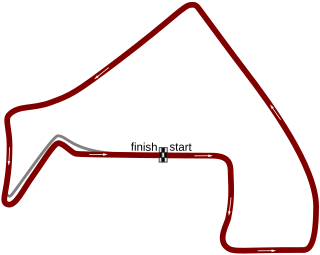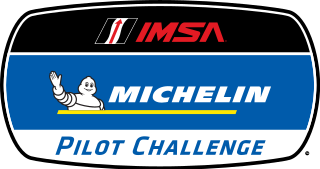
The Pontiac Firebird is an American automobile built and produced by Pontiac from the 1967 to 2002 model years. Designed as a pony car to compete with the Ford Mustang, it was introduced on February 23, 1967, five months after GM's Chevrolet division's platform-sharing Camaro. This also coincided with the release of the 1967 Mercury Cougar, Ford's upscale, platform-sharing version of the Mustang. The name "Firebird" was also previously used by GM for the General Motors Firebird series of concept cars in the 1950s.

The Trans-Am Series presented by Pirelli is a sports car racing series held in North America. Founded in 1966, it is sanctioned by the Sports Car Club of America (SCCA). Primarily based in the United States, the series competes on a variety of track types including road courses and street circuits. Trans-Am is split into the TA and TA2 classes for silhouette racing cars, while its production classes are the GT, SGT, and XGT.
Thomas Henry Gloy is a former driver in the CART Championship Car series. He raced in the 1980 and 1984 seasons, with six career starts, including the 1984 Indianapolis 500. Despite competing in only three events in 1980, he finished 14th in points, a result of finishing each race in the top ten.

The Circuit Trois-Rivières is a street circuit in Trois-Rivières, Quebec, Canada. The circuit has been the home of the annual Grand Prix de Trois-Rivières, the longest-running street race in North America, since 1967. The circuit is located on the Terrain de l'Exposition (fairgrounds) and is unusual in that it passes through Porte Duplessis, the narrow concrete gateway of the grounds at turn 3.

The Michelin Pilot Challenge is a grand touring and touring car racing series run by the International Motor Sports Association. Originating from the Canadian Motorola Cup, the series was taken over by Grand-Am in 2001 to become the Grand-Am Cup following the demise of rival IMSA's Firehawk series of similar rules in the US. KONI became series sponsor for the start of the 2007 season when the series became known as the KONI Challenge Series, before renaming once more prior to the start of the 2009 season as the KONI Sports Car Challenge. The series name was once again changed for the 2010 season to Continental Tire Sports Car Challenge. In 2019, the series rebranded again after Michelin was selected to become the new official tire supplier of the series and thus simplified their branding name by removing Sports Car term.
The 1969 Trans-American Championship was the fourth running of the Sports Car Club of America's Trans-Am Series. The championship was open to SCCA Sedan category cars competing in Over 2 liter and Under 2 liter classes. 1969 marked the end of the use of co-drivers in the Trans-Am Championship, as most of the races were between 2.5 and 3 hours. The Over 2 liter and Under 2 liter Manufacturers' titles were won by Chevrolet and Porsche respectively.
The 1973 Trans-Am Series was the eighth running of the Sports Car Club of America's premier series. It began on April 15 and ran for six rounds. Due to the decline of demand for muscle cars in the early seventies and the energy crisis that year, 1973 is considered to be the beginning of the decline of Trans Am. In contrast to American muscle dominating previous years, Porsche won the manufacturers' championship this year. 1973 also saw the rise of silhouette cars as a way of adapting to the decline of performance cars, ultimately making the cars interchangeable with IMSA GTO and GTU.
The 1974 Trans-Am Series was the ninth running of the Sports Car Club of America's premier series. It began on May 4 and ran for only three rounds, including the Six Hours of Watkins Glen.
The 1977 Trans-Am Series was the twelfth running of the Sports Car Club of America's premier series. Porsche swept the season. All races except for the Six Hours of Watkins Glen ran for approximately one hundred miles. With the revival of the Can Am Series that year, 1977 also began a resurgence of interest in SCCA events. Trans Am would contribute with a slight resurgence in the eighties.
The 1978 Trans-Am Series was the thirteenth running of the Sports Car Club of America's premier series. It was the first time the series left North America, with a round in Mexico at the end of the season. All races except for the Six Hours of Watkins Glen ran for approximately one hundred miles.
The 1980 Trans-Am Series was the fifteenth running of the Sports Car Club of America's premier series. After several years of recovery from the decline of demand for muscle cars in the early seventies and the 1973 Oil Crisis, Trans Am evolved into a support series for the IMSA GT Championship, using vehicles that were also used in IMSA GT races. This would set the standard for the series thereafter, and this standard would be applied to the SCCA's World Challenge series many years later. Almost all of the races ran for approximately one hundred miles. Besides Watkins Glen, the only exception was Trois-Rivières.
The 1982 Trans-Am Series was the seventeenth running of the Sports Car Club of America's premier series. All races ran for approximately one hundred miles. The successful Datsun brand saw its final Trans Am victory in 1982, although the Nissan brand which replaced it did see notable success thereafter.
The 1983 Budweiser Trans-Am Championship was the eighteenth running of the Sports Car Club of America's premier series.
The 1992 Tide Trans-Am Tour was the 27th season of the Sports Car Club of America's Trans-Am Series.
The 1993 Trans-Am Series was the 28th season of the Sports Car Club of America's Trans-Am Series.
The 1994 Trans-Am Series was the 29th season of the Sports Car Club of America's Trans-Am Series.
The 1995 Trans-Am Series was the thirtieth season of the Sports Car Club of America's Trans-Am Series.
The 2001 Trans-Am Series was the 36th season of the Sports Car Club of America's Trans-Am Series. The victory at Portland would mark Dodge's final Trans Am win until the 2012 Trans-Am Series.
American Equipment Racing was a racing team that competed in the SCCA Trans-Am series in the 1980s and 1990s, and in the NASCAR Busch Grand National and Winston Cup Series during the mid-1990s.
The 2021 Trans-Am Series season was the 53rd running of the Trans-Am Series. The National Championship began on February 19 and will run for 14 rounds with one being only for TA2 cars and two only paying points for the Pro/Am Challenge. The Pro/Am Challenge was held for the first time to help SCCA competitors try out Trans Am. Points were given for two specific Pro/Am Challenge races and four other races of competitor's choice in either the national Trans Am Series or the Trans Am West Coast Championship. A separate West Coast Championship was also held with some rounds separate from the national series and some together.



